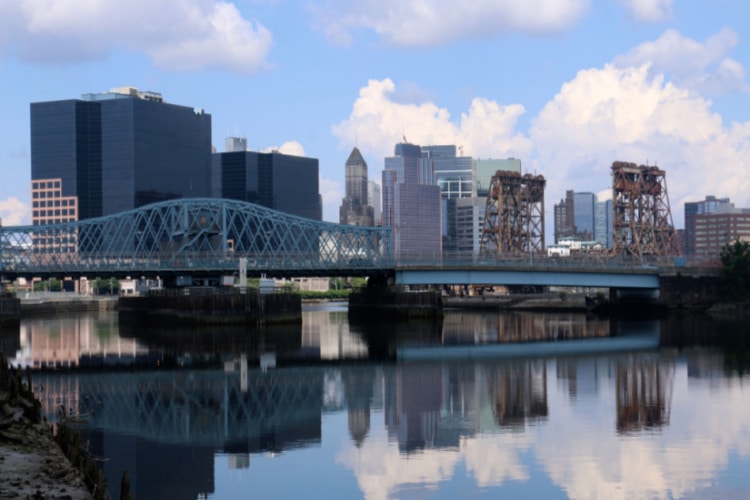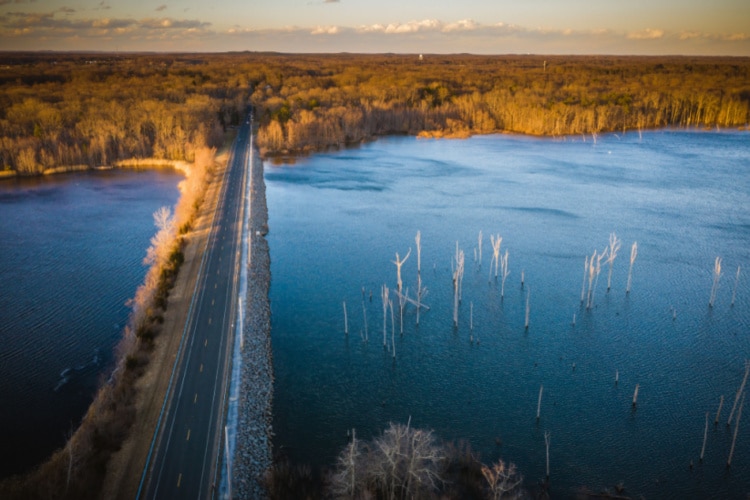In 2016, public school students in Newark, New Jersey, were tested for lead after school officials revealed that the district’s water had been contaminated with lead for years. While the source of the lead contamination turned out to be old lead pipes in the schools themselves, the incident raised the alarm among many New Jersey residents.

New Jersey Water Quality Report: What’s in the Water?
The New Jersey Department of Environmental Protection closely monitors the drinking water in all community water systems. They monitor chemical contaminants like arsenic, biological contaminants like E. coli, and radiological contaminants like Uranium.
Some contaminants that were monitored in New Jersey community water systems in 2020 include:
- Disinfection Byproducts (DBPs). Found in 159 community water systems. The effects of these contaminants are unknown, but it’s believed that they may cause cancer and reproductive defects in some people.
- Nitrate. Found in 47 community water systems. Nitrate contamination is most commonly caused by runoff from chemical fertilizers. It may cause a type of anemia called Methemoglobinemia, and a condition called “Blue Baby Syndrome.”
- Radium. Found in 10 community water systems. Radium is a naturally occurring element that can be found in groundwater. High levels of radium contamination can cause bone cancer.
- Trichloroethylene (TCE). Found in 1 community water system. TCE is an industrial solvent most commonly used as a degreaser. Inhalation or ingestion of high levels of TCE can cause lung, liver, and nervous system damage, and in extreme cases, death.
The latest data shows that, as of 2014, 95 percent of New Jersey community water systems were in compliance with microbiological standards; 98 percent in compliance with radiological standards; and 99 percent in compliance with chemical standards.
Is the Water in New Jersey Hard or Soft?
New Jersey tap water is slightly to moderately hard, with an average concentration of 106 milligrams per liter (mg/l) of magnesium, calcium, and other metals. Some neighbourhoods, such as Newark, have levels as low as 5 mg/l, while others, such as Trenton, have levels as high as 222 mg/l.
Where New Jersey Gets Its Water From
New Jersey’s fresh water comes from a variety of sources, including rivers and streams, lakes and ponds, reservoirs, and groundwater. Several basin systems supply water for many counties across New Jersey. Such as the Raritan Basin Water Supply System or the Manasquan Water Supply System.

All of these aquifers and reservoirs channel their water to numerous treatment plants to properly sanitize the water before it reaches your tap. The state has strict Surface Water Quality Standards protecting these natural resources, which means the quality of the water going into the water treatment plants is very high.
How Tap Water Is Treated in New Jersey
New Jersey residents and businesses get tap water from a wide range of sources depending on where they live and work. One in seven people in New Jersey receives their water supply from a private well on site, which is the responsibility of the landowner to monitor and maintain.
The other six out of seven people get their water from one of 600 community water systems in New Jersey. Of those providers, 40 percent are owned by private companies, while the other 60 percent are municipal suppliers operated by local governments.
Because there are so many different water suppliers in New Jersey, there is no universal water treatment process. However, all water treatment facilities in New Jersey go through a multi-step treatment process that generally includes the following steps:
- Coagulation. Iron and/or aluminum are added to the water to make dirt and other contaminants stick together.
- Flocculation. The water is mixed so the contaminants can form larger clumps.
- Sedimentation. The clumps of dirt and contaminants sink to the bottom of the treatment tank, leaving clarified water at the top.
- Filtration. The clarified water passes through a series of filters made of different materials to remove smaller particles of dirt.
- Disinfection. The clarified, filtered water is treated with chlorine or UV to kill any potentially dangerous microbes
Although every supplier has a different water treatment process, they all must adhere to federal, state, and local regulations for water quality. This means that, no matter how your local water supplier treats it, you can be confident that the water running to your house is clean and safe to drink.
Do They Have the Cleanest Tap Water?
No, New Jersey does not have the cleanest tap water in the United States. Nearly nine percent of New Jersey residents received their tap water from a community water system that experienced one or more serious drinking water violations in 2021. The only state with more violations than New Jersey was West Virginia.
On the other hand, the majority of community water systems in New Jersey are clean, and many residents have some of the cleanest tap water in the country. Some New Jersey community water systems have highly advanced treatment technology, and New Jersey’s laws and regulations, such as the “Safe Water Drinking Act,” ensure that the drinking water is safe.
Conclusion
New Jersey tap water is safe to drink. While nearly nine percent of residents receive their water from a community water system with drinking water violations, the vast majority of systems are compliant with state and federal drinking water standards. If you live or work in New Jersey, you can feel confident that your drinking water is safe.
if I am one the 9 per cent that gets my drinking water from a system that has violations is the water still safe to drink and which towns are in the 9 per cent?
Hi Dennis, your first question is easier to answer than the second, but both are tricky and here’s why. If you are in an area that is served by a water source and/or process that has previously been cited for violations, this seems a reasonable precedent for you to keep in mind for current or future issues. Unless you have some convincing assurance and data from your local authorities that these problems have been rectified and ensured to not occur again. Regarding your second question, that will take a non-trivial amount of research to really pinpoint this. I would recommend that you look at the references/links we provided in the article to do your own research to dig up the facts for your specific area. Our general advice for folks in states that have established histories of issues with providing clean water to its residents is to seriously consider a water filter system to keep their households healthy and safe.